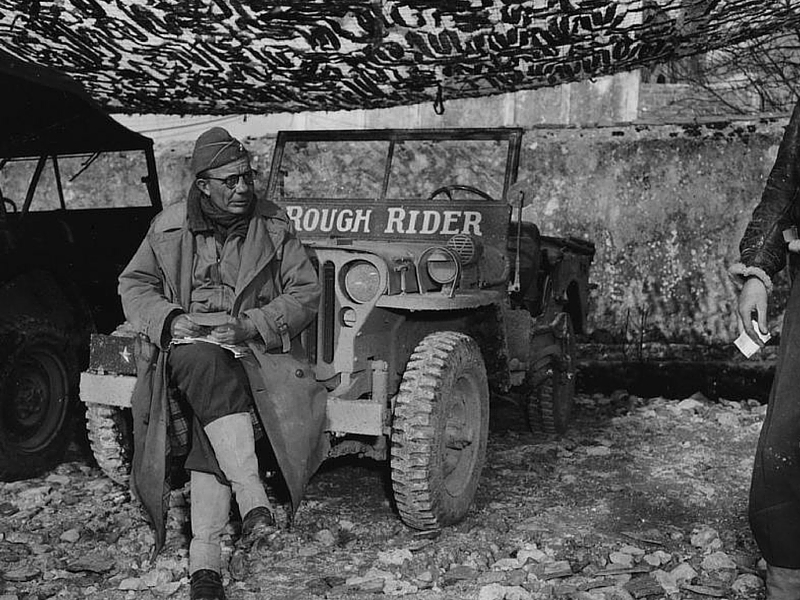Theodore Roosevelt, Jr. was the eldest son of President Teddy Roosevelt and Edith Roosevelt. Ted, as he was often called, had served in WWI on the front lines and again in WWII as Brigadier General. He volunteered and was the first general to hit the beach on D-Day even though he was in his mid-50s, walked with a cane and had other serious health issues due to his WWI service.
Author, Stephen Ambrose, in his remarkable book D-Day, writes of Roosevelt and his actions on June 6, 1944.
General Roosevelt was in the first boat to hit the shore. Maj. Gen. Barton had initially refused Roosevelt’s request to go in with the 8th Infantry, but Roosevelt argued that having a general land in the first wave would boost morale for the troops. “They’ll figure that if a general is going in, it can’t be that rough.”
…
Roosevelt joined them, walking calmly up to their position, using his cane (he had had a heart attack), wearing a wool-knit cap (he hated helmets), ignoring the fire….Roosevelt and
In the fog of battle in today’s global marketplace it’s not all that hard to find yourself “at the wrong place.” The market is dynamic; it can move at Internet speed. Being global and interconnected, it is complicated. It is relentless; somebody, somewhere is working. 24/7/365. Most likely they have an electronic device and an internet connection. So, it’s not that hard to find yourself at the wrong place
Then what do you do? If you have the resolve that comes from courage, a clear vision for something better, and the willingness to lead, you “start the war (battle for winning in the market) right here.”
By the way, Roosevelt’s decision to start the battle regardless of location error (approximately 2 kilometers off course on Utah Beach), worked in favor of the allies. Resistance from this part of the Atlantic Wall coastal defenses was considerably weaker than expected. Once the beach head was secured, it was used as a port to unload hundreds of thousands of men and approximately 800,000 tons of equipment.
Unfortunately, not all business leaders have this kind of resolve, courage, vision or willingness to lead. They miss the “opportunities” created by being at the wrong place. They wait for the battle to come to them. The battle either passes them by (the market shrinks or disappears) or the battle comes with such ferocity that they are overwhelmed (they achieve market irrelevance).
When General Omar Bradley was asked to name the single bravest thing he saw in combat, his response was “Ted Roosevelt on Utah Beach.” Roosevelt’s calm on the beach and on the spot leadership during the off-target landing, greatly aided those very first crucial minutes, and early days of the D-Day invasion.
In Other Words…
“Success is not final, failure is not fatal: it is the courage to continue that counts.” ― Winston S. Churchill
“All things are ready, if our mind be so.” ― William Shakespeare, Henry V
“In the sea of desperation, there are ships of opportunities” ― Constance Chuks Friday
“Why should we look to the past in order to prepare for the future? Because there is nowhere else to look.” ― James Burke, Connections
“I wanted you to see what real courage is, instead of getting the idea that courage is a man with a gun in his hand. It’s when you know you’re licked before you begin, but you begin anyway and see it through no matter what.” – Atticus Finch ― Harper Lee, To Kill a Mockingbird
“Most men would rather deny a hard truth than face it.” ― George R.R. Martin, A Game of Thrones
In The Word…
“I can do all things through him who strengthens me.” -Philippians 4:13 (ESV)






